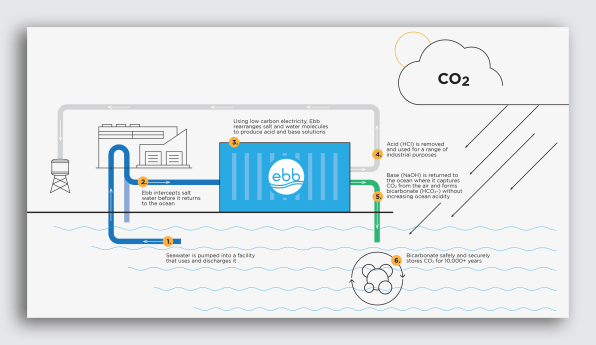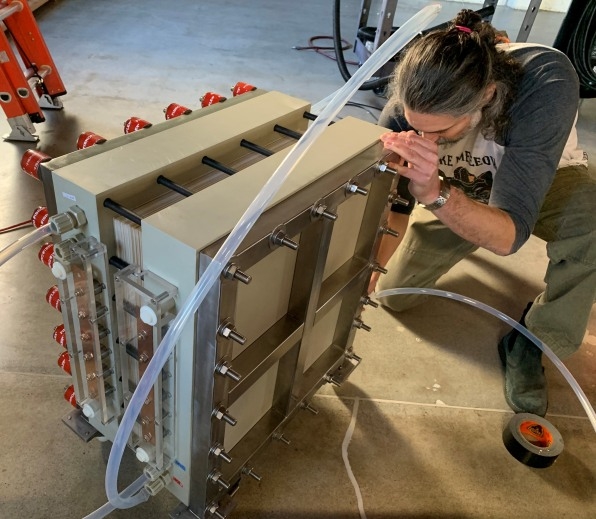This tech uses seawater to fight climate change—and stops another ocean disaster in the process
Nearly a third of the CO2 that humans pump into the atmosphere ends up in the ocean. That’s helping slow down climate change—at least for now—but as the water absorbs so much extra carbon dioxide, it’s also becoming more acidic and harming marine life, especially animals with shells like oysters and mussels. Along the West Coast, acidification is happening twice as fast as the global average.
A new startup wants to accelerate the ocean’s ability to remove CO2, while simultaneously making the water less acidic. “The natural cycle of the ocean has the ability to absorb a tremendous amount of CO2 in the form of natural bicarbonate,” says Ben Tarbell, CEO of the startup, called Ebb Carbon, who previously led a team working on new climate tech at X, Alphabet’s innovation arm. “If we can just boost that process through electrochemistry, we can safely and durably sequester a lot of carbon for a long time.”
Right now, when CO2 in the air enters seawater, it goes through a series of chemical reactions, eventually breaking down into hydrogen ions—which make the water acidic—and bicarbonate, a form of carbon dioxide that stays in the water. Ebb Carbon’s process is designed to work at industrial plants that are already using seawater, such as desalination plants, which turn saltwater into drinking water.

When it launches, the new technology will intercept the saltwater that these facilities would normally dump back into the ocean. The startup’s proprietary process uses low-carbon electricity to rearrange salt and water molecules, making an acid that can be removed and used in industrial processes, and sodium hydroxide, which is alkaline. When the sodium hydroxide is pumped back into the ocean, it can capture CO2 from the air and form bicarbonate without creating the normal acidity. The bicarbonate can store carbon dioxide in the ocean for at least 10,000 years.

[Photo: Ebb Carbon]
The process is much less expensive than some other forms of carbon removal, including direct air-capture plants, which use fans to pull air through filters that capture CO2. “The reason we’re able to enable a lower cost is that at a high level, we use less energy than other methods,” Tarbell says. “We’re essentially using a lot of the energy from the wind and ocean for mixing and capture of the CO2. And then we also don’t require additional energy to process CO2 once it’s captured—all of that is handled through the natural processes of the ocean.” Within five years, the company expects its cost for capturing a ton of CO2 to fall below $100 a ton, the standard benchmark for cost effectiveness of carbon-removal projects. Direct air capture, while also coming down in cost, is at least five times more expensive now.
Though the startup just announced its first customer, Stripe—which placed a $1.5 million order for carbon removal that will be fulfilled when the technology launches—Ebb Carbon is still in discussions to find its first partner to house the tech. There still may be hurdles before it can be implemented; the company’s scientists are studying the impacts of the process on marine life, though they expect that it will be beneficial, not harmful. The technology uses a modular design that fits in shipping containers, making it easier to expand. “We’ve built this for scale,” says Tarbell. “And we don’t see any impediments to scale beyond the multi-gigaton scale per year of [CO2] drawdown.”
The technology can help offset emissions as companies decarbonize, and ultimately could help remove “legacy” emissions that have built up over time. “We’re already facing the consequences of too much CO2 in the atmosphere,” he says. “So we’re trying to solve the problem that we’ve already created, in addition to helping alleviate making the problem worse.”
Correction: We’ve updated this article to reflect that Ebb Carbon’s first customer is Stripe, not Shopify.
Fast Company , Read Full Story
(27)



